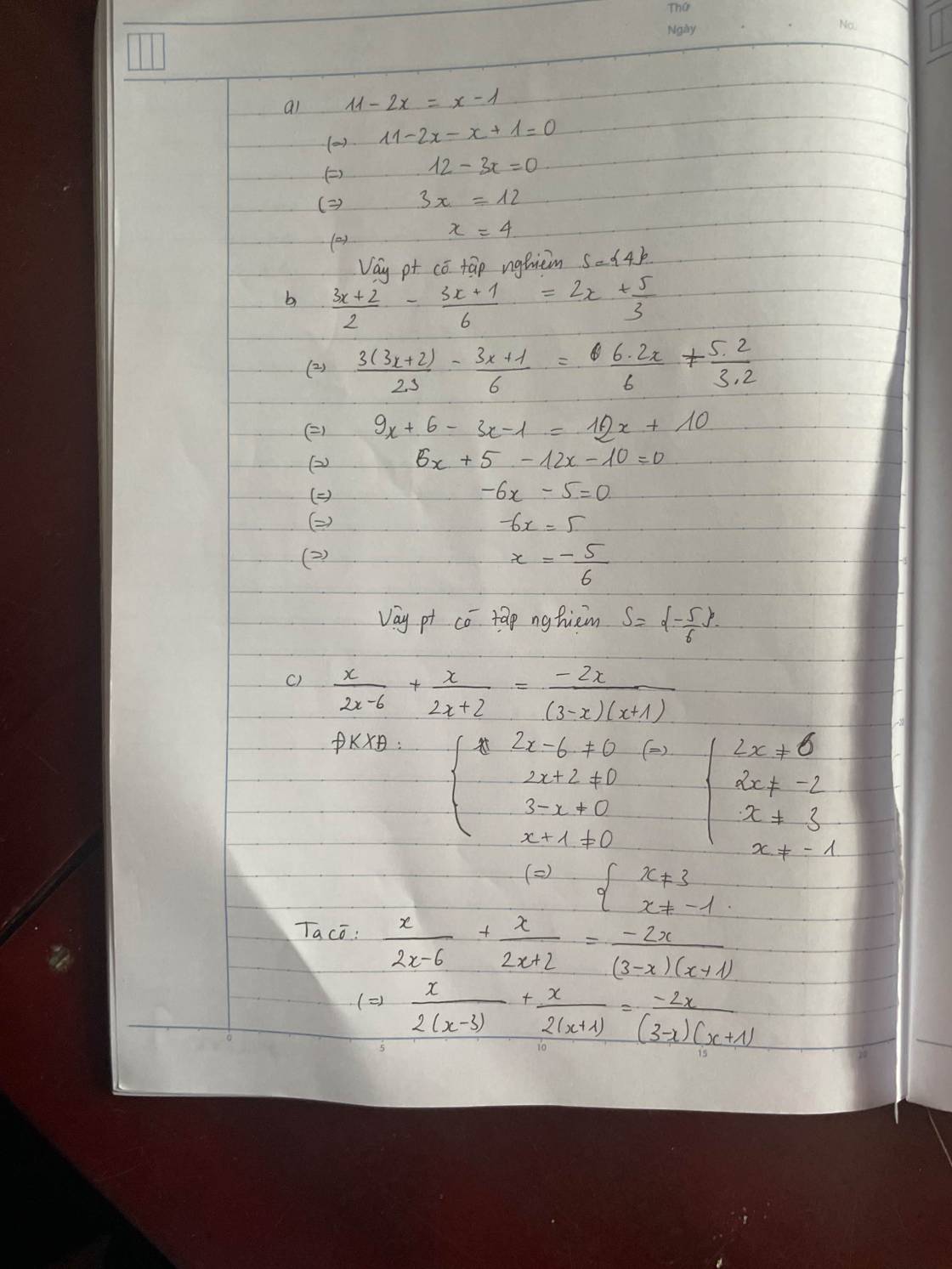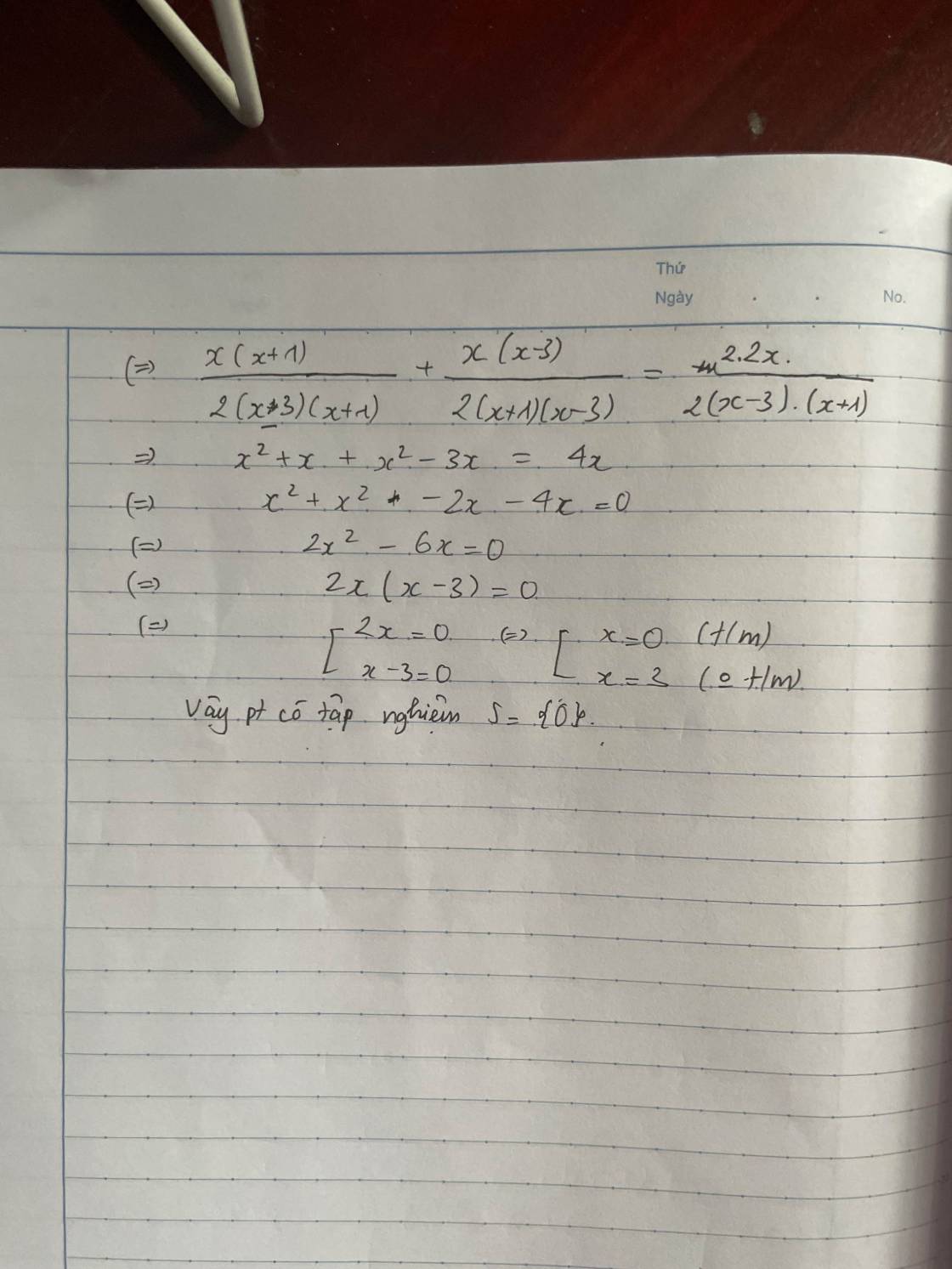Hãy nhập câu hỏi của bạn vào đây, nếu là tài khoản VIP, bạn sẽ được ưu tiên trả lời.

Bài 2:
\(A=\dfrac{2}{-x^2-2x-2}=\dfrac{-2\left(-x^2-2x-2\right)-2x^2-4x-2}{-x^2-2x-2}\) \(=-2+\dfrac{2\left(x+1\right)^2}{-x^2-2x-2}\ge-2\)
Dấu bằng xảy ra \(\Leftrightarrow x+1=0\Leftrightarrow x=-1\)
Vậy \(A_{Min}=-2\) khi \(x=-1\)
Bài 1:
a) Ta có: \(2x^2-6=0\)
\(\Leftrightarrow2x^2=6\)
\(\Leftrightarrow x^2=3\)
hay \(x\in\left\{\sqrt{3};-\sqrt{3}\right\}\)
Vậy: \(S=\left\{\sqrt{3};-\sqrt{3}\right\}\)

a: =>-3x=-12
=>x=4
b: =>3(3x+2)-3x-1=12x+10
=>9x+6-3x-1=12x+10
=>12x+10=6x+5
=>6x=-5
=>x=-5/6
c: =>x(x+1)+x(x-3)=4x
=>x^2+x+x^2-3x-4x=0
=>2x^2-6x=0
=>2x(x-3)=0
=>x=3(loại) hoặc x=0(nhận)

Bài 1:
a.
$(4x^2+4x+1)-x^2=0$
$\Leftrightarrow (2x+1)^2-x^2=0$
$\Leftrightarrow (2x+1-x)(2x+1+x)=0$
$\Leftrightarrow (x+1)(3x+1)=0$
$\Rightarrow x+1=0$ hoặc $3x+1=0$
$\Rightarrow x=-1$ hoặc $x=-\frac{1}{3}$
b.
$x^2-2x+1=4$
$\Leftrightarrow (x-1)^2=2^2$
$\Leftrightarrow (x-1)^2-2^2=0$
$\Leftrightarrow (x-1-2)(x-1+2)=0$
$\Leftrightarrow (x-3)(x+1)=0$
$\Leftrightarrow x-3=0$ hoặc $x+1=0$
$\Leftrightarrow x=3$ hoặc $x=-1$
c.
$x^2-5x+6=0$
$\Leftrightarrow (x^2-2x)-(3x-6)=0$
$\Leftrightarrow x(x-2)-3(x-2)=0$
$\Leftrightarrow (x-2)(x-3)=0$
$\Leftrightarrow x-2=0$ hoặc $x-3=0$
$\Leftrightarrow x=2$ hoặc $x=3$
2c.
ĐKXĐ: $x\neq 0$
PT $\Leftrightarrow x-\frac{6}{x}=x+\frac{3}{2}$
$\Leftrightarrow -\frac{6}{x}=\frac{3}{2}$
$\Leftrightarrow x=-4$ (tm)
2d.
ĐKXĐ: $x\neq 2$
PT $\Leftrightarrow \frac{1+3(x-2)}{x-2}=\frac{3-x}{x-2}$
$\Leftrightarrow \frac{3x-5}{x-2}=\frac{3-x}{x-2}$
$\Rightarrow 3x-5=3-x$
$\Leftrightarrow 4x=8$
$\Leftrightarrow x=2$ (không tm)
Vậy pt vô nghiệm.

a) ĐKXĐ: \(x\ne3\)
Ta có: \(\dfrac{x^2-x-6}{x-3}=0\)
\(\Leftrightarrow\dfrac{\left(x+2\right)\left(x-3\right)}{x-3}=0\)
Suy ra: x+2=0
hay x=-2(thỏa ĐK)
Vậy: S={-2}
d)
ĐKXĐ: \(x\notin\left\{1;3\right\}\)
Ta có: \(\dfrac{x+5}{x-1}=\dfrac{x+1}{x-3}-\dfrac{8}{x^2-4x+3}\)
\(\Leftrightarrow\dfrac{\left(x+5\right)\left(x-3\right)}{\left(x-1\right)\left(x-3\right)}=\dfrac{\left(x+1\right)\left(x-1\right)}{\left(x-3\right)\left(x-1\right)}-\dfrac{8}{\left(x-1\right)\left(x-3\right)}\)
Suy ra: \(x^2-3x+5x-15=x^2-1-8\)
\(\Leftrightarrow2x-15+9=0\)
\(\Leftrightarrow2x-6=0\)
hay x=3(loại)
Vậy: \(S=\varnothing\)

a) ĐKXĐ: x≠-5
Ta có: \(\dfrac{2x-5}{x+5}=4\)
\(\Leftrightarrow2x-5=4\left(x+5\right)\)
\(\Leftrightarrow2x-5=4x+20\)
\(\Leftrightarrow2x-5-4x-20=0\)
\(\Leftrightarrow-2x-25=0\)
\(\Leftrightarrow-2x=25\)
hay \(x=\dfrac{-25}{2}\)(nhận)
Vậy: \(S=\left\{-\dfrac{25}{2}\right\}\)
b) ĐKXĐ: x≠0
Ta có: \(\dfrac{x^2-4}{x}=\dfrac{2x+3}{2}\)
\(\Leftrightarrow2\left(x^2-4\right)=x\left(2x+3\right)\)
\(\Leftrightarrow2x^2-8=2x^2+3x\)
\(\Leftrightarrow2x^2-8-2x^2-3x=0\)
\(\Leftrightarrow-3x-8=0\)
\(\Leftrightarrow-3x=8\)
hay \(x=\dfrac{-8}{3}\)(nhận)
Vậy: \(S=\left\{-\dfrac{8}{3}\right\}\)
c) ĐKXĐ: \(x\notin\left\{\dfrac{1}{2};-5\right\}\)
Ta có: \(\dfrac{2x+3}{2x-1}=\dfrac{x-3}{x+5}\)
\(\Leftrightarrow\left(2x+3\right)\left(x+5\right)=\left(2x-1\right)\left(x-3\right)\)
\(\Leftrightarrow2x^2+10x+3x+15=2x^2-6x-x+3\)
\(\Leftrightarrow2x^2+13x+15=2x^2-7x+3\)
\(\Leftrightarrow2x^2+13x+15-2x^2+7x-3=0\)
\(\Leftrightarrow20x+12=0\)
\(\Leftrightarrow20x=-12\)
hay \(x=-\dfrac{3}{5}\)(nhận)
Vậy: \(S=\left\{-\dfrac{3}{5}\right\}\)
d) ĐKXĐ: \(x\notin\left\{-7;\dfrac{3}{2}\right\}\)
Ta có: \(\dfrac{3x-2}{x+7}=\dfrac{6x+1}{2x-3}\)
\(\Leftrightarrow\left(3x-2\right)\left(2x-3\right)=\left(x+7\right)\left(6x+1\right)\)
\(\Leftrightarrow6x^2-9x-4x+6=6x^2+x+42x+7\)
\(\Leftrightarrow6x^2-13x+6=6x^2+43x+7\)
\(\Leftrightarrow6x^2-13x+6-6x^2-43x-7=0\)
\(\Leftrightarrow-56x-1=0\)
\(\Leftrightarrow-56x=1\)
hay \(x=-\dfrac{1}{56}\)(nhận)
Vậy: \(S=\left\{-\dfrac{1}{56}\right\}\)

1:
a: =>(|x|+4)(|x|-1)=0
=>|x|-1=0
=>x=1; x=-1
b: =>x^2-4>=0
=>x>=2 hoặc x<=-2
d: =>|2x+5|=2x-5
=>x>=5/2 và (2x+5-2x+5)(2x+5+2x-5)=0
=>x=0(loại)

a) Ta có: \(\dfrac{x+5}{3x-6}-\dfrac{1}{2}=\dfrac{2x-3}{2x-4}\)
\(\Leftrightarrow\dfrac{2\left(x+5\right)}{6\left(x-2\right)}-\dfrac{3\left(x-2\right)}{6\left(x-2\right)}=\dfrac{3\left(2x-3\right)}{6\left(x-2\right)}\)
Suy ra: \(2x+5-3x+6=6x-9\)
\(\Leftrightarrow-x+11-6x+9=0\)
\(\Leftrightarrow20-7x=0\)
\(\Leftrightarrow7x=20\)
hay \(x=\dfrac{20}{7}\)(thỏa ĐK)
Vậy: \(S=\left\{\dfrac{20}{7}\right\}\)


a: \(\Leftrightarrow6x^2-2x=6x^2-13\)
=>-2x=-13
hay x=13/2
b: \(\dfrac{x}{3}-\dfrac{2x+1}{6}=\dfrac{x}{6}-x\)
=>2x-2x-1=x-6x
=>-5x=-1
hay x=1/5
c: \(\Leftrightarrow\left(x+1\right)^2-\left(x-1\right)^2=x^2+3\)
\(\Leftrightarrow x^2+3-x^2-2x-1+x^2-2x-1=0\)
\(\Leftrightarrow\left(x-1\right)\left(x-3\right)=0\)
=>x=3